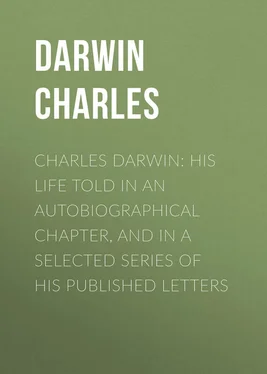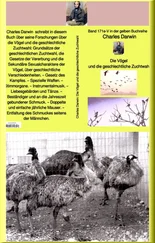Charles Darwin - Charles Darwin - His Life Told in an Autobiographical Chapter, and in a Selected Series of His Published Letters
Здесь есть возможность читать онлайн «Charles Darwin - Charles Darwin - His Life Told in an Autobiographical Chapter, and in a Selected Series of His Published Letters» — ознакомительный отрывок электронной книги совершенно бесплатно, а после прочтения отрывка купить полную версию. В некоторых случаях можно слушать аудио, скачать через торрент в формате fb2 и присутствует краткое содержание. Жанр: foreign_antique, foreign_prose, на английском языке. Описание произведения, (предисловие) а так же отзывы посетителей доступны на портале библиотеки ЛибКат.
- Название:Charles Darwin: His Life Told in an Autobiographical Chapter, and in a Selected Series of His Published Letters
- Автор:
- Жанр:
- Год:неизвестен
- ISBN:нет данных
- Рейтинг книги:5 / 5. Голосов: 1
-
Избранное:Добавить в избранное
- Отзывы:
-
Ваша оценка:
- 100
- 1
- 2
- 3
- 4
- 5
Charles Darwin: His Life Told in an Autobiographical Chapter, and in a Selected Series of His Published Letters: краткое содержание, описание и аннотация
Предлагаем к чтению аннотацию, описание, краткое содержание или предисловие (зависит от того, что написал сам автор книги «Charles Darwin: His Life Told in an Autobiographical Chapter, and in a Selected Series of His Published Letters»). Если вы не нашли необходимую информацию о книге — напишите в комментариях, мы постараемся отыскать её.
Charles Darwin: His Life Told in an Autobiographical Chapter, and in a Selected Series of His Published Letters — читать онлайн ознакомительный отрывок
Ниже представлен текст книги, разбитый по страницам. Система сохранения места последней прочитанной страницы, позволяет с удобством читать онлайн бесплатно книгу «Charles Darwin: His Life Told in an Autobiographical Chapter, and in a Selected Series of His Published Letters», без необходимости каждый раз заново искать на чём Вы остановились. Поставьте закладку, и сможете в любой момент перейти на страницу, на которой закончили чтение.
Интервал:
Закладка:
Charles Darwin
Charles Darwin: His Life Told in an Autobiographical Chapter, and in a Selected Series of His Published Letters
Dear Holland,
This book is associated in my mind with St. Moritz (where I worked at it), and therefore with you.
I inscribe your name on it, not only in token of my remembrance of your many acts of friendship, but also as a sign of my respect for one who lives a difficult life well.
Yours gratefully, Francis Darwin."For myself I found that I was fitted for nothing so well as for the study of Truth; … as being gifted by nature with desire to seek, patience to doubt, fondness to meditate, slowness to assert, readiness to reconsider, carefulness to dispose and set in order; and as being a man that neither affects what is new nor admires what is old, and that hates every kind of imposture. So I thought my nature had a kind of familiarity and relationship with Truth." – Bacon. (Proem to the Interpretatio Naturæ .)
PREFACE
TO THE FIRST EDITION (1892)
In preparing this volume, which is practically an abbreviation of the Life and Letters (1887), my aim has been to retain as far as possible the personal parts of those volumes. To render this feasible, large numbers of the more purely scientific letters are omitted, or represented by the citation of a few sentences. 1 1 I have not thought it necessary to indicate all the omissions in the abbreviated letters.
In certain periods of my father's life the scientific and the personal elements run a parallel course, rising and falling together in their degree of interest. Thus the writing of the Origin of Species , and its publication, appeal equally to the reader who follows my father's career from interest in the man, and to the naturalist who desires to know something of this turning point in the history of Biology. This part of the story has therefore been told with nearly the full amount of available detail.
In arranging my material I have followed a roughly chronological sequence, but the character and variety of my father's researches make a strictly chronological order an impossibility. It was his habit to work more or less simultaneously at several subjects. Experimental work was often carried on as a refreshment or variety, while books entailing reasoning and the marshalling of large bodies of facts were being written. Moreover many of his researches were dropped only to be resumed after years had elapsed. Thus a chronological record of his work would be a patchwork, from which it would be difficult to disentangle the history of any given subject. The Table of Contents will show how I have tried to avoid this result. It will be seen, for instance, that after Chapter VIII. a break occurs; the story turns back from 1854 to 1831 in order that the Evolutionary chapters which follow may tell a continuous story. In the same way the Botanical Work which occupied so much of my father's time during the latter part of his life is treated separately in Chapters XVI. and XVII.
With regard to Chapter IV., in which I have attempted to give an account of my father's manner of working, I may be allowed to say that I acted as his assistant during the last eight years of his life, and had therefore an opportunity of knowing something of his habits and methods.
My acknowledgments are gladly made to the publishers of the Century Magazine , who have courteously given me the use of one of their illustrations for the heading of Chapter IV.
FRANCIS DARWIN.Wychfield, Cambridge,
August, 1892 .
NOTE TO THE SECOND EDITION
It is pleasure to me to acknowledge the kindness of Messrs. Elliott & Fry in allowing me to reproduce the fine photograph which appears as the frontispiece to the present issue.
FRANCIS DARWIN.Wychfield, Cambridge,
April, 1902 .
CHAPTER I.
THE DARWINS
Charles Robert Darwin was the second son of Dr. Robert Waring Darwin, of Shrewsbury, where he was born on February 12, 1809. Dr. Darwin was a son of Erasmus Darwin, sometimes described as a poet, but more deservedly known as physician and naturalist. Charles Darwin's mother was Susannah, daughter of Josiah Wedgwood, the well-known potter of Etruria, in Staffordshire.
If such speculations are permissible, we may hazard the guess that Charles Darwin inherited his sweetness of disposition from the Wedgwood side, while the character of his genius came rather from the Darwin grandfather. 2 2 See Charles Darwin's biographical sketch of his grandfather, prefixed to Ernst Krause's Erasmus Darwin . (Translated from the German by W. S. Dallas, 1878.) Also Miss Meteyard's Life of Josiah Wedgwood .
Robert Waring Darwin was a man of well-marked character. He had no pretensions to being a man of science, no tendency to generalise his knowledge, and though a successful physician he was guided more by intuition and everyday observation than by a deep knowledge of his subject. His chief mental characteristics were his keen powers of observation, and his knowledge of men, qualities which led him to "read the characters and even the thoughts of those whom he saw even for a short time." It is not therefore surprising that his help should have been sought, not merely in illness, but in cases of family trouble and sorrow. This was largely the case, and his wise sympathy, no less than his medical skill, obtained for him a strong influence over the lives of a large number of people. He was a man of a quick, vivid temperament, with a lively interest in even the smaller details in the lives of those with whom he came in contact. He was fond of society, and entertained a good deal, and with his large practice and many friends, the life at Shrewsbury must have been a stirring and varied one – very different in this respect to the later home of his son at Down. 3 3 The above passage is, by permission of Messrs. Smith & Elder, taken from my article Charles Darwin , in the Dictionary of National Biography .
We have a miniature of his wife, Susannah, with a remarkably sweet and happy face, bearing some resemblance to the portrait of her father painted by Sir Joshua Reynolds; a countenance expressive of the gentle and sympathetic nature which Miss Meteyard ascribes to her. 4 4 A Group of Englishmen , by Miss Meteyard, 1871.
She died July 15, 1817, thirty-two years before her husband, whose death occurred on November 13, 1848. Dr. Darwin lived before his marriage for two or three years on St. John's Hill, afterwards at the Crescent, where his eldest daughter Marianne was born, lastly at the "Mount," in the part of Shrewsbury known as Frankwell, where the other children were born. This house was built by Dr. Darwin about 1800, it is now in the possession of Mr. Spencer Phillips, and has undergone but little alteration. It is a large, plain, square, red-brick house, of which the most attractive feature is the pretty green-house, opening out of the morning-room.
The house is charmingly placed, on the top of a steep bank leading down to the Severn. The terraced bank is traversed by a long walk, leading from end to end, still called "the Doctor's Walk." At one point in this walk grows a Spanish chestnut, the branches of which bend back parallel to themselves in a curious manner, and this was Charles Darwin's favourite tree as a boy, where he and his sister Catharine had each their special seat.
The Doctor took great pleasure in his garden, planting it with ornamental trees and shrubs, and being especially successful with fruit trees; and this love of plants was, I think, the only taste kindred to natural history which he possessed.
Читать дальшеИнтервал:
Закладка:
Похожие книги на «Charles Darwin: His Life Told in an Autobiographical Chapter, and in a Selected Series of His Published Letters»
Представляем Вашему вниманию похожие книги на «Charles Darwin: His Life Told in an Autobiographical Chapter, and in a Selected Series of His Published Letters» списком для выбора. Мы отобрали схожую по названию и смыслу литературу в надежде предоставить читателям больше вариантов отыскать новые, интересные, ещё непрочитанные произведения.
Обсуждение, отзывы о книге «Charles Darwin: His Life Told in an Autobiographical Chapter, and in a Selected Series of His Published Letters» и просто собственные мнения читателей. Оставьте ваши комментарии, напишите, что Вы думаете о произведении, его смысле или главных героях. Укажите что конкретно понравилось, а что нет, и почему Вы так считаете.












